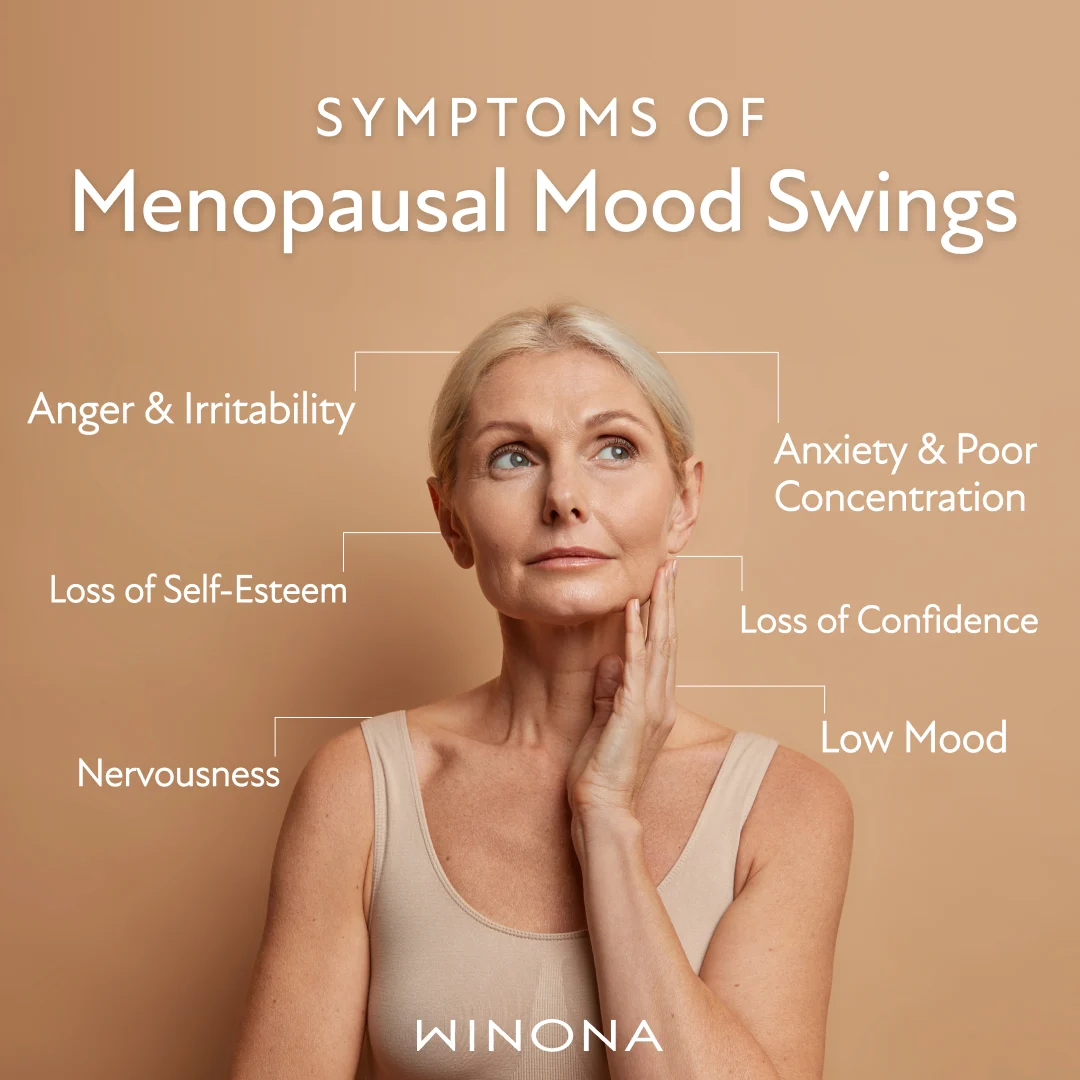Menopause is a significant transition in women’s lives, associated with profound physical and emotional changes. As women mark the end of their childbearing years, they often face a mix of emotions. While this period brings confidence and wisdom, hormonal changes can also cause cognitive and mental health symptoms.
All in all, the emotional journey through menopause can be overwhelming, resulting in mood swings. In fact, nearly 50% of women in menopausal transition go through these mood swings.1
These feelings are not imagined, and if mood changes are affecting quality of life, it’s recommended to consult a physician. Effective management options are available to support emotional well-being and other menopause symptoms during this transitional phase.

Causes and Types of Mood Changes
Researchers believe that hormonal fluctuations might be the cause of many mood changes experienced during menopause. The drop in estrogen levels impacts brain function by reducing the activity of serotonin and norepinephrine, which are substances vital for mood regulation.2
However, not all women will experience mood swings. Risk factors can make some women more prone to mood changes during menopause, including a history of depression, high levels of stress, and poor physical health.2
Here are the four common types of mood changes and their causes:
Depression
Estrogen is closely tied to serotonin, the “happy hormone,” so when estrogen levels fall, serotonin levels do too. This decrease in serotonin can lead to persistent feelings of sadness and hopelessness, contributing to depression during menopause.2
Anxiety
Decreased estrogen levels are associated with a rise in cortisol, the stress hormone. Higher cortisol levels can exacerbate feelings of worry and fear, leading to increased anxiety during this period.3
Irritability
Lower estrogen levels have also been linked to irritability and frustration. This hormonal shift can make individuals more sensitive to minor issues, leading to increased anger and irritability.2
Mood Swings
Fluctuating estrogen levels can result in rapid and unpredictable changes in mood. Some individuals' brains are more sensitive to these hormonal changes, making them less resilient to stress and contributing to mood swings.4
How can I cope with the emotional changes of menopause?
Asking for Help
It's essential for women experiencing mood changes during menopause to communicate their feelings with family, friends, a doctor, or a counselor — someone who can offer support and a sympathetic ear.5
Understanding the reasons behind low moods or feelings of depression can be a significant step toward finding effective solutions. Open conversations can provide support and clarity, helping to navigate this challenging phase with greater ease.
Talking Therapies
It's not uncommon for women to feel guilty or self-indulgent about spending time and money on counseling or coaching. However, exploring emotions with an objective professional can be incredibly relieving. Any investment in this process is self-care and absolutely worthwhile.6
Cognitive behavioral therapy (CBT): CBT can be particularly effective in understanding and managing emotions. It helps identify negative thought patterns and break the cycle of negativity, providing tools to cope better with mood changes.
Counseling: Finding a good counselor can make a significant difference. It’s advisable to speak with several counselors to find the right fit, as a strong therapeutic relationship is essential for effective support.
Medication
Antidepressants and anti-anxiety medications: These medications can improve mood, aid in sleep, and reduce anxiety. It's important for women to discuss the risks and benefits with their doctor to determine if this treatment is suitable for them.
Hormone replacement therapy (HRT): Hormone replacement therapy, with or without progesterone, depending on whether a woman has had a hysterectomy, can be an effective option for alleviating mood swings and other menopause-related symptoms. Consulting with a healthcare provider can help determine if HRT is the right choice.
How Menopause May Contribute to Depression
Hormonal Fluctuations
As mentioned above, fluctuations in estrogen levels are linked to depression. Additionally, researchers have identified higher levels of a brain protein called monoamine oxidase A (MAO-A) in individuals entering perimenopause. This protein is associated with depressive symptoms, further explaining the emotional challenges during this phase.7
Sleep Problems
Experiencing bouts of insomnia during perimenopause is common, often due to nighttime hot flashes. This disrupted sleep can significantly impact emotional well-being. In fact, poor sleep increases the likelihood of developing depression by up to ten times.8
Life Changes
During the menopausal transition, many women begin to reflect deeply on their lives or contemplate mortality. They may ponder their life's direction or purpose, question whether they have had enough children, or confront the sorrow of not having children if that was their desire. This period of introspection and significant life transitions can make menopause particularly difficult and emotionally taxing, predisposing women to depression.1
Can hormone replacement therapy (HRT) help mood swings during menopause?
Various studies have shown that hormone replacement therapy can relieve emotional symptoms linked to menopause. Besides, estrogen is believed to have an antidepressant effect in perimenopausal women, especially those experiencing hot flashes or night sweats.9
Experiencing menopausal mood swings? Discover if HRT is right for you.
If you’ve entered the menopause transition and are struggling with mood swings, you don’t have to suffer in silence. Take our brief menopause quiz to see if you’re an eligible candidate for HRT. Get started with Winona to take the first step toward feeling better.